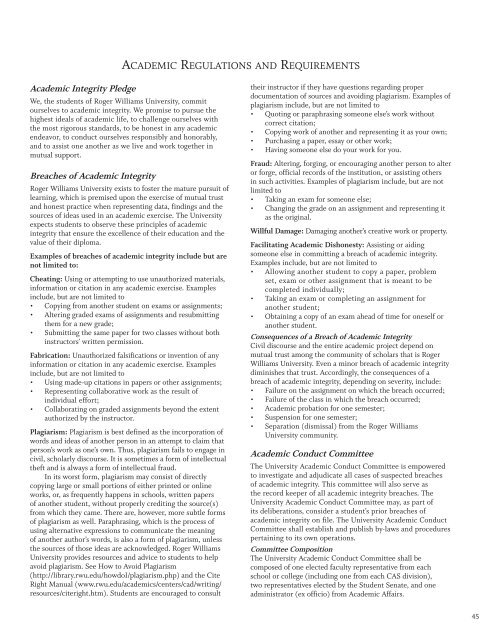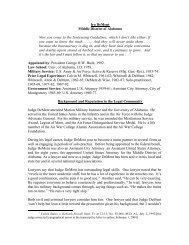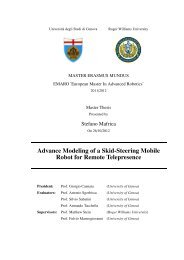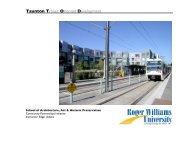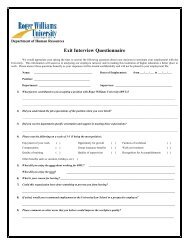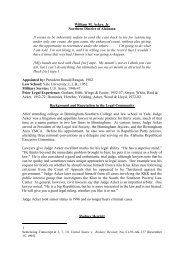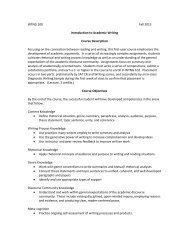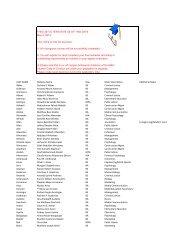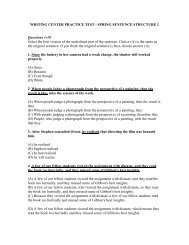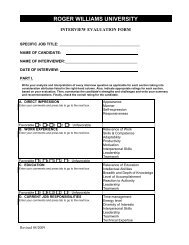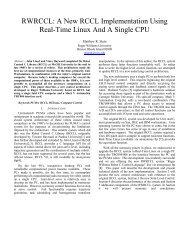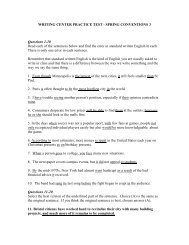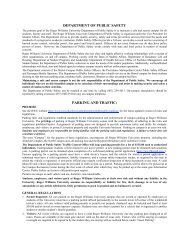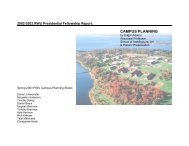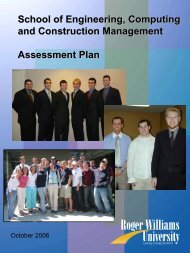Download PDF - Roger Williams University
Download PDF - Roger Williams University
Download PDF - Roger Williams University
You also want an ePaper? Increase the reach of your titles
YUMPU automatically turns print PDFs into web optimized ePapers that Google loves.
Academic Regulations and Requirements<br />
Academic Integrity Pledge<br />
We, the students of <strong>Roger</strong> <strong>Williams</strong> <strong>University</strong>, commit<br />
ourselves to academic integrity. We promise to pursue the<br />
highest ideals of academic life, to challenge ourselves with<br />
the most rigorous standards, to be honest in any academic<br />
endeavor, to conduct ourselves responsibly and honorably,<br />
and to assist one another as we live and work together in<br />
mutual support.<br />
Breaches of Academic Integrity<br />
<strong>Roger</strong> <strong>Williams</strong> <strong>University</strong> exists to foster the mature pursuit of<br />
learning, which is premised upon the exercise of mutual trust<br />
and honest practice when representing data, findings and the<br />
sources of ideas used in an academic exercise. The <strong>University</strong><br />
expects students to observe these principles of academic<br />
integrity that ensure the excellence of their education and the<br />
value of their diploma.<br />
Examples of breaches of academic integrity include but are<br />
not limited to:<br />
Cheating: Using or attempting to use unauthorized materials,<br />
information or citation in any academic exercise. Examples<br />
include, but are not limited to<br />
• Copying from another student on exams or assignments;<br />
• Altering graded exams of assignments and resubmitting<br />
them for a new grade;<br />
• Submitting the same paper for two classes without both<br />
instructors’ written permission.<br />
Fabrication: Unauthorized falsifications or invention of any<br />
information or citation in any academic exercise. Examples<br />
include, but are not limited to<br />
• Using made-up citations in papers or other assignments;<br />
• Representing collaborative work as the result of<br />
individual effort;<br />
• Collaborating on graded assignments beyond the extent<br />
authorized by the instructor.<br />
Plagiarism: Plagiarism is best defined as the incorporation of<br />
words and ideas of another person in an attempt to claim that<br />
person’s work as one’s own. Thus, plagiarism fails to engage in<br />
civil, scholarly discourse. It is sometimes a form of intellectual<br />
theft and is always a form of intellectual fraud.<br />
In its worst form, plagiarism may consist of directly<br />
copying large or small portions of either printed or online<br />
works, or, as frequently happens in schools, written papers<br />
of another student, without properly crediting the source(s)<br />
from which they came. There are, however, more subtle forms<br />
of plagiarism as well. Paraphrasing, which is the process of<br />
using alternative expressions to communicate the meaning<br />
of another author’s words, is also a form of plagiarism, unless<br />
the sources of those ideas are acknowledged. <strong>Roger</strong> <strong>Williams</strong><br />
<strong>University</strong> provides resources and advice to students to help<br />
avoid plagiarism. See How to Avoid Plagiarism<br />
(http://library.rwu.edu/howdoI/plagiarism.php) and the Cite<br />
Right Manual (www.rwu.edu/academics/centers/cad/writing/<br />
resources/citeright.htm). Students are encouraged to consult<br />
their instructor if they have questions regarding proper<br />
documentation of sources and avoiding plagiarism. Examples of<br />
plagiarism include, but are not limited to<br />
• Quoting or paraphrasing someone else’s work without<br />
correct citation;<br />
• Copying work of another and representing it as your own;<br />
• Purchasing a paper, essay or other work;<br />
• Having someone else do your work for you.<br />
Fraud: Altering, forging, or encouraging another person to alter<br />
or forge, official records of the institution, or assisting others<br />
in such activities. Examples of plagiarism include, but are not<br />
limited to<br />
• Taking an exam for someone else;<br />
• Changing the grade on an assignment and representing it<br />
as the original.<br />
Willful Damage: Damaging another’s creative work or property.<br />
Facilitating Academic Dishonesty: Assisting or aiding<br />
someone else in committing a breach of academic integrity.<br />
Examples include, but are not limited to<br />
• Allowing another student to copy a paper, problem<br />
set, exam or other assignment that is meant to be<br />
completed individually;<br />
• Taking an exam or completing an assignment for<br />
another student;<br />
• Obtaining a copy of an exam ahead of time for oneself or<br />
another student.<br />
Consequences of a Breach of Academic Integrity<br />
Civil discourse and the entire academic project depend on<br />
mutual trust among the community of scholars that is <strong>Roger</strong><br />
<strong>Williams</strong> <strong>University</strong>. Even a minor breach of academic integrity<br />
diminishes that trust. Accordingly, the consequences of a<br />
breach of academic integrity, depending on severity, include:<br />
• Failure on the assignment on which the breach occurred;<br />
• Failure of the class in which the breach occurred;<br />
• Academic probation for one semester;<br />
• Suspension for one semester;<br />
• Separation (dismissal) from the <strong>Roger</strong> <strong>Williams</strong><br />
<strong>University</strong> community.<br />
Academic Conduct Committee<br />
The <strong>University</strong> Academic Conduct Committee is empowered<br />
to investigate and adjudicate all cases of suspected breaches<br />
of academic integrity. This committee will also serve as<br />
the record keeper of all academic integrity breaches. The<br />
<strong>University</strong> Academic Conduct Committee may, as part of<br />
its deliberations, consider a student’s prior breaches of<br />
academic integrity on file. The <strong>University</strong> Academic Conduct<br />
Committee shall establish and publish by-laws and procedures<br />
pertaining to its own operations.<br />
Committee Composition<br />
The <strong>University</strong> Academic Conduct Committee shall be<br />
composed of one elected faculty representative from each<br />
school or college (including one from each CAS division),<br />
two representatives elected by the Student Senate, and one<br />
administrator (ex officio) from Academic Affairs.<br />
45


